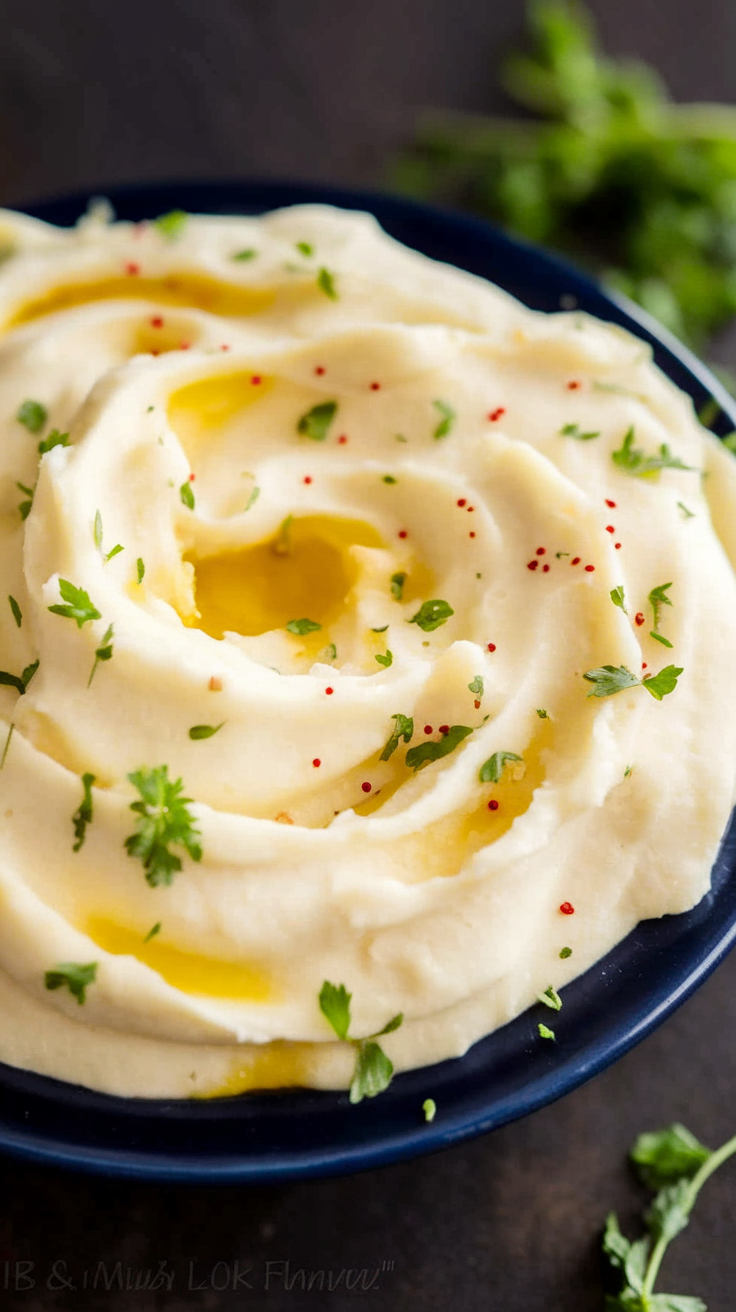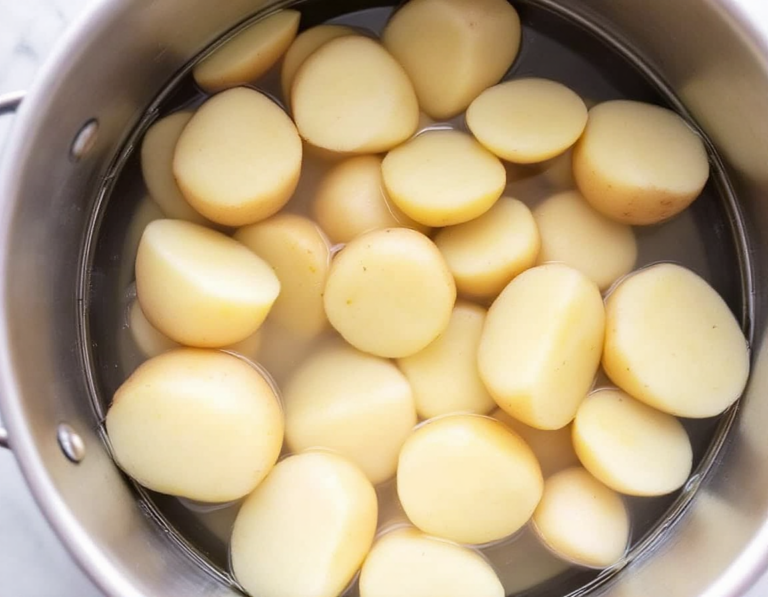Ah, mashed potatoes—those fluffy, buttery clouds of comfort on a plate. Have you ever noticed how they seem to warm not just your belly but your very soul? I mean, who needs a cozy blanket when you can have this creamy goodness on a chilly evening, right?
Steps
- Begin by peeling and rinsing the russet potatoes in cold water. If needed, cut larger potatoes in half and remove any knots using a small spoon or potato peeler. Place the potatoes in a large pot, cover with cold water, and bring to a boil. Cook partially covered for about 20-25 minutes until they are easily pierced with a fork, ensuring not to overcook them.
- After boiling, drain the potatoes thoroughly and transfer them to a stand mixer bowl. Break the potatoes apart lightly using a whisk attachment or potato masher. Start mixing on low speed for 30 seconds, then increase to medium speed while gradually adding 1 to 1 1/4 cups of hot milk until you achieve the desired texture.
- With the mixer running, incorporate softened butter into the potatoes, adding 1 tablespoon at a time and waiting until each portion is mixed in. Continue whipping until the potatoes are fluffy, then season with 1 1/2 teaspoons of salt or adjust to taste. To keep the mashed potatoes warm, cover them and place in a warm oven or transfer to a slow cooker on a low setting until ready to serve.
Ingredients
- 4 pounds of russet potatoes (approximately 12 medium), peeled
- 1 to 1 1/4 cups of hot whole milk
- 16 tablespoons of unsalted butter (2 sticks), softened at room temperature
- 1 1/2 teaspoons of salt, or to taste
- 1 tablespoon of freshly chopped parsley or chives for garnish (optional)
Nutritional Values
Calories: 3190 kcal | Carbs: 340 g | Protein: 50 g | Fat: 190 g | Saturated Fat: 120 g | Polyunsaturated Fat: 10 g | Monounsaturated Fat: 50 g | Trans Fat: 10 g | Cholesterol: 510 mg | Sodium: 3740 mg | Potassium: 8060 mg | Fiber: 20 g | Sugar: 30 g | Vitamin A: 6250 IU | Vitamin C: 110 mg | Calcium: 650 mg | Iron: 20 mg
FAQ
- What type of potatoes are best for making mashed potatoes?
- Russet potatoes are recommended for this recipe as they have a starchy quality that lends itself to a creamy and smooth mash. Yukon Gold or yellow potatoes can also be used for a good texture.
- Can I prepare mashed potatoes in advance?
- Yes, mashed potatoes can be made ahead of time. You can keep them warm by placing them in a warm oven, using a bain-marie, or transferring them to a slow cooker on the warm setting.
- How do I prevent my mashed potatoes from becoming gummy?
- Avoid overcooking the potatoes and ensure they are well-drained to prevent a waterlogged texture. Overmixing can also lead to gummy potatoes, so whip them just enough to reach a fluffy consistency.
- What is the best way to reheat leftover mashed potatoes?
- To reheat, thaw frozen potatoes in the fridge overnight, then warm them on the stove, in a 350°F oven, or in the microwave with a splash of milk and a bit of butter to maintain their creamy texture.
- How can I add extra flavor to my mashed potatoes?
- While the basic recipe calls for salt, you can enhance the flavor by garnishing with fresh parsley or chives. Additionally, some people like to incorporate garlic or sour cream for additional taste.
Tips
- Cook Whole Russet Potatoes: Avoid chopping russet potatoes before boiling. Cooking them whole prevents them from becoming waterlogged or falling apart, ensuring a better texture.
- Use Softened Butter: Incorporate butter that is softened rather than melted. This enhances the flavor and helps achieve a silky, smooth consistency in your mashed potatoes.
- Incorporate Hot Milk: Adding milk that is hot will not only make it easier to blend but also helps keep your potatoes warm and creamy.
- Whip with a Mixer for Best Texture: Utilize a hand mixer or stand mixer to whip the potatoes. This method yields a fluffy texture with minimal effort compared to manual mashing, and be sure to mix while hot to avoid gumminess.
Equipment
- Stand Mixer (with whisk attachment) – If you don’t already own one, this can help achieve the smoothest, whipped texture for the mashed potatoes.
- Electric Hand Mixer – An alternative to a stand mixer if you prefer or need a more compact option.
- Large Cooking Pot (5 Qt or larger) – Essential for boiling a large quantity of potatoes.
- Potato Masher – Handy if you prefer to start mashing the potatoes by hand before using a mixer.
- Slow Cooker – Useful for keeping the mashed potatoes warm if you don’t have a warming drawer or want to free up oven space.

I’m Heather, the founder of Hearty Home Bites, a place where I share my love for delicious, approachable recipes and the joy of gathering around the table. What started as a personal project quickly grew into a trusted resource for home cooks everywhere.

